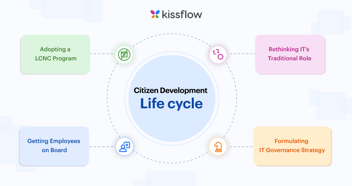Related Articles

5 MINUTES READ
How Citizen Development Mitigates the Mishaps in IT?
5 MINUTES READ
Citizen Developer vs Professional Developer: Key Differences
Team Kissflow
Updated on 23 Apr 2025 • 5 min read
Over the last few years, many organizations have launched digital transformation initiatives, causing their IT departments to be overwhelmed. There’s an unending IT request pipeline, and keeping up is impossible. Due to this, enterprise solutions aren’t built on time. 72% of IT leaders say project backlogs prevent them from working on important projects.
Here’s where citizen developers have stepped in to save the day. They alleviate the massive burden on IT, increase app development speed, and boost innovation. Application development is no longer an exclusive field for people with programming knowledge. Thanks to the democratization of technology, more people now have access to technological solutions.
Citizen developers are non-technical employees with little to no coding experience that build applications with IT-approved technology. While the concept of employees building their own solutions isn’t new, organizations have only started to realize the potential impact of empowering them. At the moment, 61% of organizations either have or plan to have citizen development programs.
Citizen developers understand their organization's or department's processes and have advanced digital skills to create new apps or change existing apps without involving IT. They use low-code/no-code platforms, unlike professional developers who use pro code to build solutions.
Citizen development has become popular for 2 reasons:
there’s a software developer shortage and
the demand for new solutions is always increasing.
In a constantly changing business landscape, organizations must be agile to meet employee and consumer needs. They must develop solutions that streamline business processes fast. But overworked IT departments can’t keep up with demands for new solutions.
When non-developers have the power to create their apps, they can build solutions more quickly, relieving IT from backlogs.
The average time span for custom software development is 4 to 12 months. But according to a study by KPMG, 85% of software development projects go over schedule. Writing code takes time, and that’s where low-code comes in. Low-code platforms can reduce app development time significantly.
Citizen developers don’t have a huge backlog like pro developers and they know business processes in and out. This helps them build useful and sustainable business applications quickly without relying too much on the IT team.
Disengaged employees cost businesses billions of dollars every year in lost productivity. Most employees say they’re frustrated at work because there are no opportunities for personal and professional growth. Low-code empowers employees through citizen development to focus on improving and creating business-critical operations.
They are equipped with tools to build solutions that solve business problems. This motivates employees to be more involved in the work they perform, boosts their morale, and promotes professional development.
Learn more: Supercharge Productivity and Innovation with Citizen Development
Some employees usually work around IT security protocols and access unauthorized programs to get their work done. They download, subscribe to, and share apps that help them do their jobs well. But when employees use unapproved software and devices, they create security vulnerabilities.
Low-code platforms help citizen developers avoid shadow IT. They can build highly customizable apps using IT-approved citizen developer tools that are flexible enough to be tweaked to any specific workflow. By collaborating with IT, they can build effective solutions that don’t put their organizations at risk.

Thank you for Downloading
The rising demand for new technological solutions has burdened IT with never-ending tech requests. And as pro-developers become overwhelmed, they burn out and quit. IT departments have always shouldered the burden of developing and deploying applications. But they often lack the time and resources to address more than the most pressing projects.
Citizen developers reduce the burden on IT by creating their own business applications and automating business processes more quickly. Since they fully understand their business sectors, they are in the best position to improve their workflows.
Most successful business owners believe that agility is the most important characteristic of an organization as it helps them adapt quickly to external or internal market changes. Agile organizations have a faster time to market, futuristic innovation, and offer an enhanced customer experience.
Citizen developers deal with problems immediately instead of sitting and waiting for IT to find time to help. This boosts business agility as they minimize the time between identifying issues and solving them.
Learn more: What are the competitive advantages of citizen development?
Low-code tools allow citizen developers to build apps far quicker, thanks to their visual interfaces and pre-built modules. The time spent on app testing and development is significantly reduced and productivity levels take a sharp upturn.
Citizen developers respond quickly to the dynamic business landscape. The approach they use not only speeds innovation and application development but also reduces backlogs and allows IT to prioritize and deal with more pressing enterprise issues.
Learn more: How does citizen development help build tech outside IT?
The employee digital experience refers to technology's impact on employees’ lives at work. For example, IT is always under pressure to develop new solutions, employees don’t have apps that streamline their work, and everyone is always working hard to get more done faster. As a result, employees have a poor digital experience. They are stressed and less productive.
Citizen development drastically improves the digital experience for employees in and outside the IT department. The approach helps citizen developers to take action on the key drivers of employee experience. They also relieve the IT team’s backlog, allowing them to work more effectively on tasks that demand their full expertise.
Learn more: How is citizen development fundamental to the digital workplace?
User adoption is a key part of digital transformation. There’s no need to buy advanced tools your employees can’t integrate into their work. If they could build exactly what they need to do their work, they’d use the tools more actively, promoting a healthy digital culture. That’s why it’s so important to empower citizen developers.
By encouraging tech-savvy employees to build and manage their own apps, an organization can easily fuel their business to be digitally agile and progressive.
IT teams need help to implement digital transformation initiatives. They are overwhelmed and are unable to deliver new solutions fast enough. What happens in such a case? Work stalls and everyone gets frustrated. Slower response times also make it hard to compete in a constantly evolving marketplace or meet business objectives.
With citizen developers, a business can fast-track digital transformation and stand out in a crowded marketplace. Organizations that build solutions fast are more successful—because there's a correlation between business growth and corporate culture of innovation. Citizen development ensures that this happens.
Learn more: How Does Citizen Development Facilitate Digital Transformation?
In the digital age, an organization's ability to adapt quickly to market pressures and changing customer expectations is critical to its success. The citizen development framework helps businesses to be more flexible, agile, and future-proof.
In the coming years, more organizations will use citizen development as a solution to their growing digital transformation needs. Gartner on citizen development says that by 2023, the ratio of citizen developers to professional developers in large enterprises will be four to one. Soon, citizen development will be a critical aspect of most modern enterprises.
Kissflow's citizen development platform is a unified low-code, no-code platform that brings business and IT users closer together by enabling citizen developers to build and manage custom apps. If you are looking to elevate your business with an effective citizen development framework, try Kissflow work platform today.
Related Articles


Welcome.
Let's get started.
To begin, tell us a bit about yourself
By proceeding, you agree to our Terms of Service and Privacy Policy
"The beauty of Kissflow is how quick and easy it is to create the apps I need. It's so user-friendly that I made exactly what I needed in 30 minutes."
Oliver Umehara
IT Manager - SoftBank
A Trusted Choice for Companies Globally




Thank you for signing up
Someone from our team will contact you soon.

Know why all the IT leaders converging at booth #602
Earn a chance to be part of our experience event

Get the first look at the 2024 Citizen Development report
Welcome.
Let's get started.
By proceeding, you agree to our Terms of Service and Privacy Policy
Wondering where to start?
Let's talk!
Connect with our solution experts to gain insights on how Kissflow can help you transform ideas into reality and accelerate digital transformation

This website uses cookies to ensure you get the best experience. Check our Privacy Policy